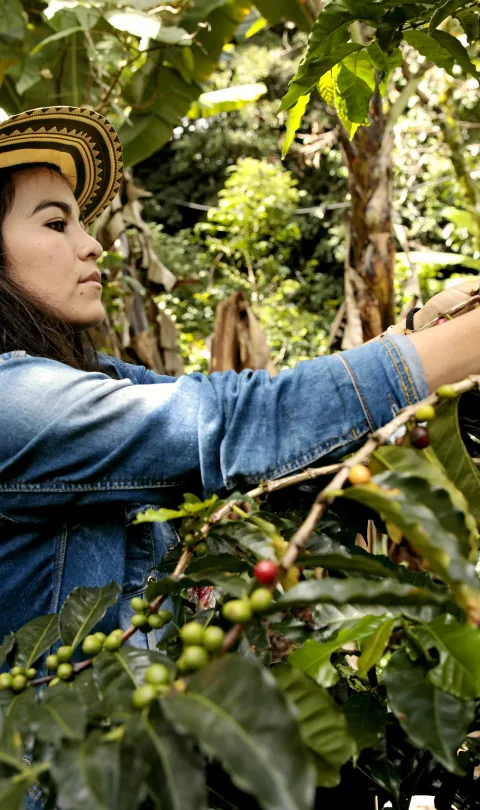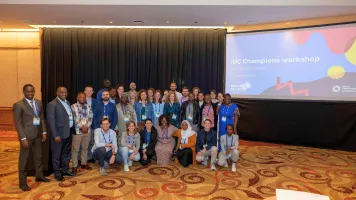Changing how a statistical system collects, analyzes, and shares data is ambitious and complex to implement, but often necessary. In Colombia, evolving how the statistical system generates data is essential to identifying and tackling inequalities.
Colombia’s National Administrative Department for Statistics (DANE) recently took important steps towards encouraging and standardizing more inclusive, disaggregated data across the national system with the launch of a new guide, ‘Differential and Intersectional Approaches to Statistical Production’. (Available in Spanish, with an executive summary in English).
“Data and statistics hold tremendous power to build a more equal and inclusive society. To fulfill their potential, statistics must be inclusive of all and disaggregated to reveal different population groups’ specific situations. The new guide will help us to work together across the statistical system to generate the data needed to ensure no one is left behind,” said Juan Daniel Oviedo, Director of DANE, at the virtual launch event in December 2020.
The guide outlines why adopting a ‘Differential and Intersectional Approach’ across the statistical system is important to creating a more accurate picture of different population groups. The differential approach is a principle applied to reparations and transitional justice from Colombia’s internal conflict - outlined in the 2011 Victim’s Law - which recognizes that the legacy of the conflict disproportionately affected some groups.
Inequalities often overlap or ‘intersect’ in ways that create and compound disadvantage. A differential and intersectional approach involves disaggregating data by multiple dimensions – such as gender, ethnicity, age, disability, location, migration status, income and other characteristics – to identify inequalities, disparities, and the most marginalized and vulnerable groups. With this data, we can better understand the structure of these gaps and motivate and guide response.
Take the case of women and girls living in rural areas who belong to minority ethnic groups. They are among the population groups that are most likely to be ‘left behind’. They are more likely to get married, have a partner or have children earlier in their lives, negatively affecting their chances of completing education, finding paid work, and being economically independent. Numerous factors - in this case, age, geography, socio-economic status, gender, and ethnicity - intersect to reinforce their marginalization.
Taking a differential and intersectional approach requires thoughtful planning and deliberation - to identify which disaggregation dimensions are relevant and decide how to structure data collection. The guide sets out guidelines on putting the approach into action and outlines inclusive language and principles to avoid reproducing stereotypes.
The guide has four chapters:
- A conceptual framework outlining basic definitions for including these approaches in the statistical process and questions for their capture.
- The frame of reference highlighting the national and international normative context to the inclusion of differential approaches in statistical production.
- A diagnosis of the state of differential and intersectoral approaches in the national statistical production, identifying the strengths and challenges of applying these approaches in Colombia’s statistical production.
- Guidelines for mainstreaming the differential and intersectoral approach in national statistical production.
The guide was developed by DANE’s Intersectional and Differential Approach Statistics Unit (known by the Spanish acronym GEDI), which brings together economists, anthropologists, and psychologists with statisticians and external advisors. The unit drew on the Inclusive Data Charter's principles to inform and inspire their work.
“The guide puts people, especially those who are marginalized or vulnerable, at the center of statistical processes. The aim is to adapt daily processes across the national statistical system, all of those small changes add up to creating a system that supports an inclusive and equitable society.” said Mercedes Pedrero, an expert in intersectional approaches on data processes at UN Women.
Collaboration and consultation were central to developing the guide - DANE worked closely with many national and global partners and consulted with the public before finalizing. The guide aims to inform and spark broad dialogue with statisticians, policymakers, academia, civil society, journalists, and the private sector on data production and use. The launch event kicked off this dialogue with national and international workshops where stakeholders discussed the guide, shared experiences, and identified common challenges to address together.
The guide’s launch is an important first step towards embedding disaggregation and inclusivity at all levels of Colombia’s national statistical system. Listening and learning will continue to be central as we move towards implementing the guidance. We hope to hear from others who are pioneering similar approaches and are interested in engaging further with the guide or our related work.
Learn more about DANE’s decision to adopt a differential and intersectional approach.


